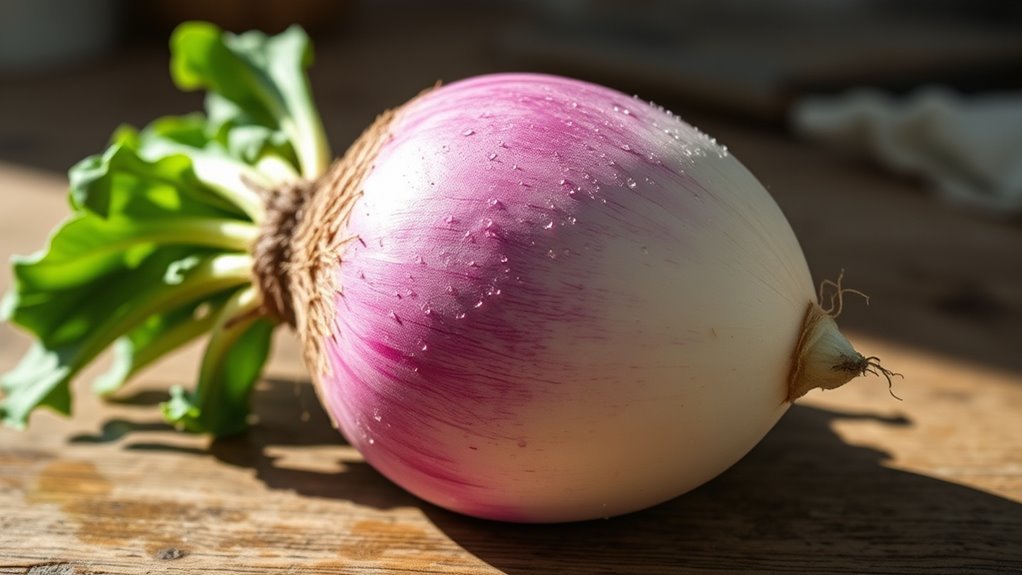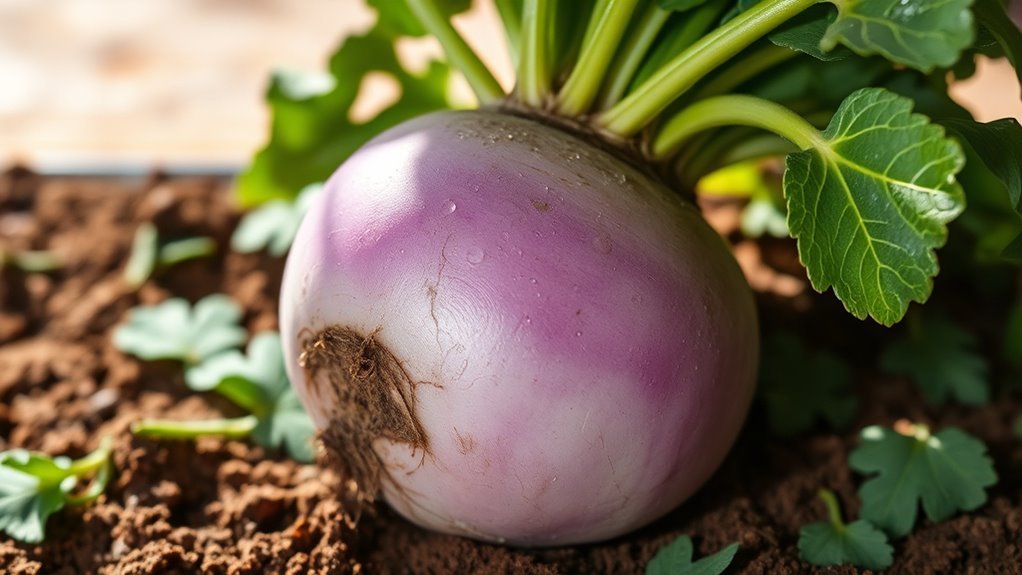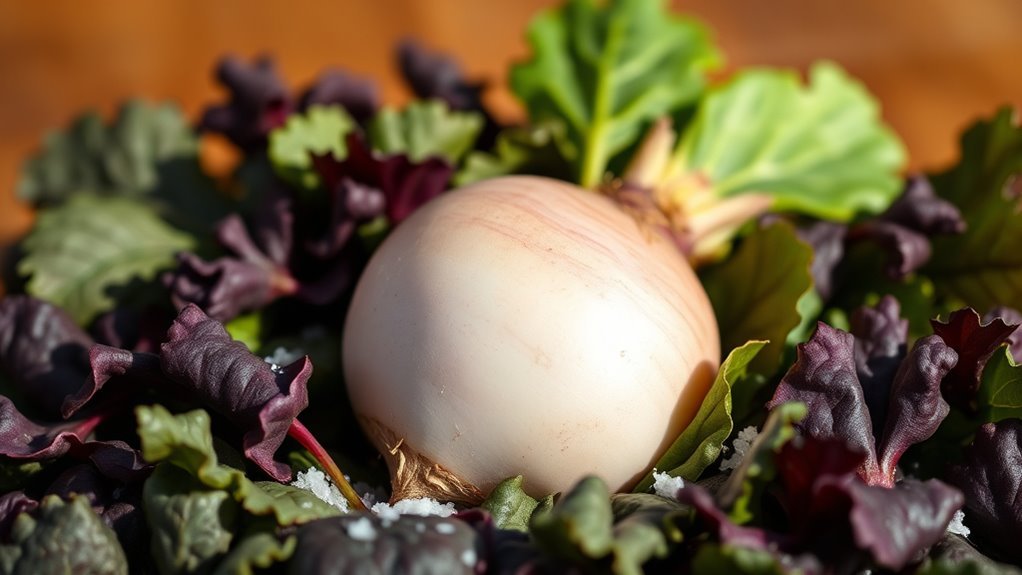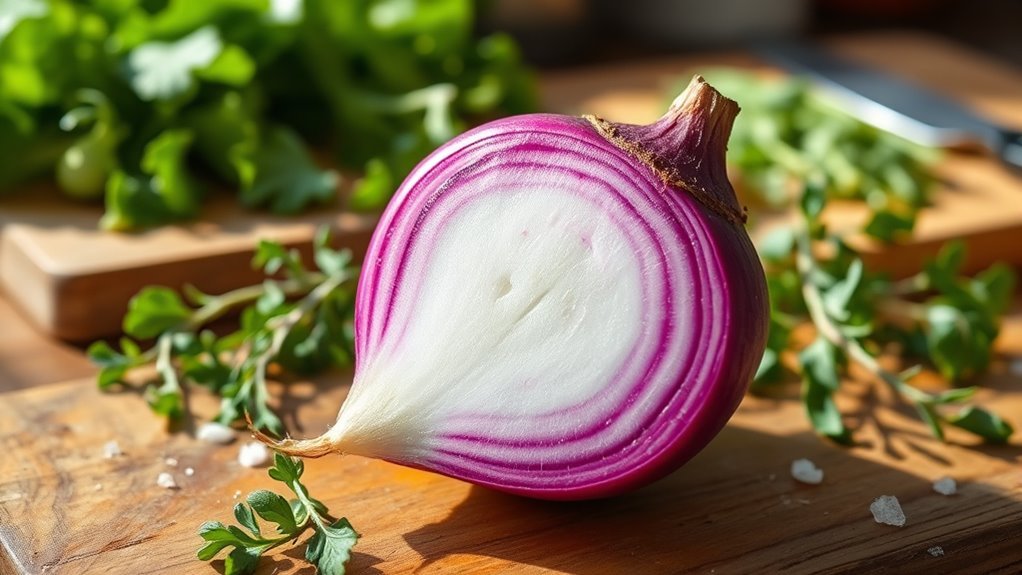Yes, turnips are keto-friendly! With only about 4 grams of net carbs per 100 grams, they fit well within your daily carb limits. They’re low in calories but rich in essential vitamins and minerals, making them an excellent addition to a low-carb diet. Plus, turnips promote digestive health thanks to their high fiber content. You’ll find various cooking methods that enhance their natural flavor, and there’s more to discover about their benefits and uses.
Nutritional Profile of Turnips

Turnips, often overlooked in the vegetable aisle, boast a nutritional profile that can be quite appealing, especially for those following a keto diet. These root vegetables come in various turnip varieties, including white, purple, and yellow, each offering unique flavors and textures. Packed with vitamins C and K, turnips also provide essential minerals like potassium and calcium, making them a nutritious choice. When preparing turnips, consider roasting or mashing them for a delightful side dish. You can also add them to soups for an earthy flavor. Remember, using herbs and spices can enhance their taste. With these cooking tips, you can easily incorporate turnips into your meals, enjoying their health benefits while staying keto-friendly.
Carbohydrate Content in Turnips

When it comes to carbohydrate content, turnips offer a favorable option for those on a keto diet. With only about 6 grams of carbs per 100 grams, they’re a smart choice. Different turnip varieties may have slightly varying carb levels, but they generally remain low. Here’s why you might consider incorporating them into your meals:
Turnips are a keto-friendly option with just 6 grams of carbs per 100 grams, making them a nutritious addition to your meals.
- Low in sugar
- Rich in fiber
- Versatile in turnip recipes
- Nutrient-dense
- Supports blood sugar control
You can enjoy roasted, mashed, or even in soups, making them an excellent addition to your keto-friendly lifestyle. Always keep an eye on portion sizes to maintain your carb intake, but rest assured that turnips can fit nicely into your meal plan while offering nutritious benefits.
Health Benefits of Turnips

Turnips are packed with essential nutrients while being low in calories, making them a great addition to your diet. Their nutrient density means you get a lot of vitamins and minerals without the extra calories, which can support overall health. Incorporating turnips into your meals can help you maintain a balanced and satisfying eating plan.
Nutrient Density Benefits
Although often overlooked, turnips boast an impressive nutrient profile that can contribute considerably to a balanced diet. Their high vitamin content supports your overall health, enhancing nutrient absorption and offering various benefits. Here are some key nutrient density benefits of turnips:
- Rich in vitamins C and K, supporting immune function and bone health
- High in fiber, promoting digestive health and satiety
- Contains antioxidants, which help combat oxidative stress
- Low in calories, making them a great addition to a keto diet
- Provides essential minerals like potassium and calcium for heart and muscle function
Incorporating turnips into your meals can enrich your nutrient intake while keeping your diet diverse and satisfying. Embrace their versatility for a healthier lifestyle!
Low-Calorie Vegetable Option
While many vegetables can be high in calories, turnips stand out as a low-calorie option that can enhance your meals without compromising your dietary goals. These versatile veggies are perfect for creating delicious turnip recipes or satisfying low-calorie snacks. With just 36 calories per cup, they’re a fantastic choice for anyone looking to maintain a healthy lifestyle. Additionally, turnips are rich in dietary fiber, which promotes digestive health and helps regulate blood sugar levels.
Here’s a quick comparison of turnips with some other popular vegetables:
| Vegetable | Calories (per 1 cup) |
|---|---|
| Turnips | 36 |
| Carrots | 52 |
| Broccoli | 55 |
| Cauliflower | 25 |
| Zucchini | 19 |
Incorporating turnips into your diet can help you enjoy flavorful dishes while keeping your calorie count in check.
Turnips vs. Other Low-Carb Vegetables
When comparing turnips to other low-carb vegetables, it’s essential to look at their nutritional profiles and carbohydrate content. Turnips are relatively low in carbs, but so are other options like spinach, zucchini, and cauliflower. Understanding these differences can help you make informed choices that align with your keto diet goals. Additionally, incorporating leafy greens into your meals can enhance nutrient density while keeping carb intake low.
Nutritional Comparison Overview
Turnips are often overlooked in the domain of low-carb vegetables, yet they offer a unique nutritional profile that warrants comparison to other popular options like zucchini and cauliflower. When considering turnip varieties as keto alternatives, it’s essential to recognize:
- Low in Calories: Turnips pack fewer calories than many other vegetables.
- Rich in Nutrients: They provide vitamins C and K, essential for overall health.
- High in Fiber: This aids digestion and helps keep you full.
- Versatile: They can be roasted, mashed, or added to soups, enhancing your meals.
- Low Glycemic Index: Turnips won’t spike your blood sugar levels as much as some starchy vegetables.
Incorporating turnips into your diet can diversify your low-carb meal options while still keeping nutritional balance. Additionally, their low carb content makes them an excellent choice for maintaining a keto lifestyle.
Carbohydrate Content Analysis
Although often overshadowed by other low-carb vegetables, turnips hold their own in the carbohydrate content arena. With about 6 grams of carbs per 100 grams, they’re a great option for those on a keto diet. Compared to popular low-carb choices like zucchini or cauliflower, turnips offer a slightly higher carb count, but they also provide unique flavors and versatility. You can explore various turnip varieties, such as white or purple-top turnips, each adding distinct tastes to your meals. For cooking tips, try roasting or mashing them to enhance their natural sweetness while keeping the carb count in check. Embracing turnips can give you more freedom in your low-carb cooking while still staying within your dietary goals. Additionally, incorporating cruciferous vegetables into your meal plan can further enhance nutrient intake while keeping carbs low.
Cooking Methods for Turnips
Cooking turnips can be a delightful experience, as their versatility allows for a variety of methods that enhance their natural flavor and texture. Here are some popular techniques you might enjoy:
- Roasting turnips: Brings out their sweetness; simply toss with oil and seasonings, then bake until golden.
- Mashed turnips: Steam or boil until tender, then mash with butter and herbs for a creamy side dish.
- Sautéing: Quickly cook in a pan with olive oil, garlic, or spices for a flavorful addition to any meal.
- Steaming: Preserves nutrients while keeping the turnips tender and tasty.
- Pickling: A unique way to enjoy turnips, adding a tangy crunch to salads and sandwiches.
Experiment with these methods to find your favorite way to enjoy turnips!
Incorporating Turnips Into a Keto Diet
When you’re looking to incorporate turnips into a keto diet, you’ll find they’re an excellent low-carb option that can add both flavor and nutrition to your meals. Turnips are versatile; you can roast, mash, or even spiralize them as a substitute for high-carb ingredients. Consider using turnip recipes in place of potatoes or rice for a satisfying keto swap. For instance, try turnip fries seasoned with herbs or a creamy turnip puree. Not only do they provide essential vitamins and minerals, but they also help keep your carb intake in check. By adding these nutrient-dense veggies to your diet, you can enjoy a delicious variety of meals while staying committed to your keto lifestyle.
Potential Risks and Considerations
While turnips can be a great addition to a keto diet, it’s important to contemplate a few potential risks and factors before incorporating them extensively. Here are some considerations to keep in mind:
Turnips can enhance a keto diet, but consider potential allergies and digestive issues before using them frequently.
- Potential Allergies: Some people may experience allergic reactions to turnips, leading to discomfort.
- Digestive Issues: High fiber content can cause bloating or gas in sensitive individuals.
- Nutrient Imbalance: Relying heavily on turnips might lead to missing out on other essential nutrients.
- Oxalate Content: Turnips contain oxalates, which may be a concern for those prone to kidney stones.
- Individual Tolerance: Everyone’s body reacts differently, so monitor how you feel after consuming them.
Being aware of these factors can help you make informed decisions about your keto journey.
Conclusion: Are Turnips Keto-Friendly?
So, are turnips truly a keto-friendly vegetable? The answer is a resounding yes. With only about 4 grams of net carbs per 100 grams, turnips fit well within the daily carb limits of a ketogenic diet. They’re versatile too, lending themselves to a variety of delicious turnip recipes, from mash to fries, perfect for satisfying cravings without derailing your keto goals. You can also enjoy them as flavorful keto snacks, roasted or sautéed with herbs. While they do contain some natural sugars, the overall nutritional profile makes them a smart choice for maintaining ketosis. Embracing turnips in your meal planning can provide both variety and nutrition, ensuring you enjoy your keto journey with freedom and creativity. Additionally, incorporating healthy fats into your meals can enhance the overall satisfaction and nutritional balance of your ketogenic diet.
Frequently Asked Questions
Can You Eat Turnips Raw on a Keto Diet?
Absolutely, you can enjoy raw turnips on a keto diet. These crunchy delights offer a medley of raw turnip benefits, including low carbs and high fiber, making them a smart choice for a keto-friendly snack. You might consider pairing them with a flavorful dip or incorporating them into a fresh salad for added variety. Embracing this versatile vegetable can elevate your keto snack ideas while keeping your diet both enjoyable and nutritious.
Are Turnip Greens Also Keto-Friendly?
Yes, turnip greens are keto-friendly! They’re low in carbs and packed with nutritional benefits, making them a great addition to your diet. Rich in vitamins A, C, and K, as well as minerals like calcium and iron, turnip greens can support overall health. Plus, their fiber content aids digestion, which is essential for maintaining a healthy weight. You can enjoy them sautéed, in salads, or blended into smoothies for a nutrient boost!
How Do Turnips Affect Blood Sugar Levels?
Turnips gently waltz through your bloodstream, thanks to their low glycemic index, which typically falls between 30-50. This means they’re less likely to cause spikes in blood sugar response, making them a delightful choice for those watching their levels. When you enjoy turnips, you’re embracing a veggie that supports stable energy without the rollercoaster ride. So, feel free to include them in your meals for a balanced and health-conscious approach!
Can Turnips Cause Digestive Issues on Keto?
Turnips can cause digestive issues for some on keto, particularly if you’re not used to high-fiber foods. While turnip digestion generally benefits from its keto fiber content, introducing them suddenly might lead to gas or bloating. It’s best to start with small amounts and see how your body reacts. Balancing turnips with other low-carb veggies can help you enjoy their benefits without discomfort, allowing for a more enjoyable keto experience.
What Are Some Turnip Alternatives for Keto?
If you’re looking for turnip alternatives on keto, consider using cauliflower rice as a versatile substitute. It’s low in carbs and can be used in a variety of dishes. Radish substitutes are also great; they provide a similar texture and can be roasted or sautéed. Both options help you maintain your keto lifestyle without sacrificing flavor or variety. Experiment with these alternatives to keep your meals exciting and satisfying!
References
- https://www.healthline.com/nutrition/keto-friendly-vegetables
- https://www.webmd.com/diet/obesity/ss/slideshow-keto-diet-foods
- https://www.ncbi.nlm.nih.gov/pmc/articles/PMC5484115/
- https://www.medicalnewstoday.com/articles/324250
- https://www.eatright.org/health/wellness/preventing-illness/keto-diet-and-nutrition
- https://www.cdc.gov/healthyweight/healthy_eating/vegetables.html
- https://www.nhs.uk/live-well/eat-well/what-are-starchy-foods/
- https://www.sciencedirect.com/science/article/pii/S2352250X20302110


